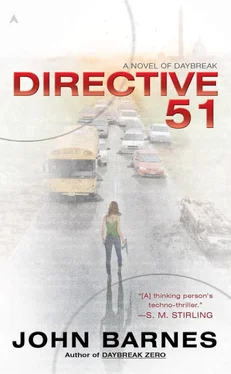They laid him out carefully on one of the benches. “You Georgia Guard need to attend to your dead. We can’t leave you here completely unarmed,” Everett explained to the exhausted, frightened young men. “But we also can’t let you interfere with what we’re doing. Now, I am going to tell you this once, and I hope you will believe me. First of all, this is Graham Weisbrod, the sole surviving member of the Cabinet, and that means he’s President, and as soon as we can we’re gonna put him in front of a Federal judge to take the oath. We were rescuing him because he was being held illegally. Your duty as loyal soldiers under oath is to help us, and I am sorry that there was no way to explain that to your brave comrades before the shooting started.
“But whether or not you believe me, I think it’s advisable for me to confiscate your weapons and move them on up the tracks to those semi trailers. I’ll leave two men with your weapons; if any of you comes out of this car while they are there, they will shoot, and they are expert snipers. Just before they depart, they’ll wave a white flag at you. I suggest you take your time about retrieving your weapons, and especially do not even think about trying to run to them and fire upon my rearguard. By way of incentive, the weapons will also be partly disassembled.
“Once you have re-secured your weapons, I suggest you immediately send a man up the track in one direction, and down the track in the other, with a red flag to stop the next train. Any questions?”
There were none. The rescue party and the freed prisoners moved out quickly, walking up the tracks until they were out of sight of the train, and then veering sharply to the west.
“I don’t suppose you’d mind telling us where we’re going,” General McIntyre said after a while. “I think the risk of recapture is small, and I’d really like to know what is going on. It sounds like some of you are serious about supporting and defending the Constitution.”
“We like to think so,” Heather said. “The bandanas are kind of hot and hard to breathe in, too, and I don’t feel like dressing like a Wild West train robber anymore, anyway.” She took hers off. “We have about an hour to walk, but we do have water in our packs. We have a stretcher if either of you is injured, but you look—”
“The water would be good, but I can walk fine,” Weisbrod said.
“Same here. Now where are we going?” the general asked.
“Peachtree; used to be one of the big general-aviation airports for Atlanta.”
“You’ve got a functioning airplane?” Weisbrod was incredulous.
“Well, for certain values of ‘airplane’ and ‘functioning,’ yes,” Arnie said.
ABOUT AN HOUR LATER. PEACHTREE AIRPORT. ATLANTA. GEORGIA. 3:15 P.M. EST. TUESDAY. DECEMBER 17.
Heather breathed a sigh of relief when they arrived at Peachtree; there was a clear runway. They’d had only three aerial and six satellite photos, all days apart, and it had always been possible that someone or something had made the field unusable.
Arnie began rigging up the transmitter, though he warned, “This’ll be tricky—I might or might not be able to reach the plane before it leaves St. Louis.”
Graham found a notepad and a pencil in the abandoned doublewide office of a construction contractor. “Too many years as an academic,” Graham said. “I can’t think if I don’t take notes. All right, Heather, I’ve been locked up for two weeks, there’s a lot I need to know. First tell me what’s up with the Castle movement. How many of them are there and what exactly are they doing that you know about?”
He grilled everyone in turn, even the Rangers, scribbling as if his life depended on it. “General McIntyre,” he said, “any new observations about what we’ve just heard?”
“Uh, I’m not sure whether I’m sad or glad that I was never one of your students.”
Sherry was running toward them. “The Ugliest Airplane in the World is coming in to land!” she shouted.
“That’s ours,” Heather said.
That was one of Bambi’s nicknames for Quattro Larsen’s cherished baby. The other was the Checker Cab of the Air. It was his rebuilt DC-3, now equipped with greased-linen tires and a homebuilt gadget that sprayed a stream of hot lye solution from a charcoal-heated pot over the generator and battery, sweeping off and killing the nanoswarm. Its top speed wasn’t even the original 150 mph, it had to stay below 10,000 feet and not fly in freezing weather because the spray could ice the engine—but it was an airplane, and it flew, and it had made it all the way here from Castle Larsen more or less on schedule.
It was bright yellow all over, except for Quattro Larsen’s personal insignia, the black-and-white-checkerboard patterns around the nose and on the tail. The rebuilt old-style radial engines ran on his homebrewed biodiesel. The blue-black streak across the wing behind each engine attested to the miserable fuel quality, and according to Bambi, the lubricants were mostly lard; she’d said she had dubbed it the Checker Cab of the Air to avoid having it called the Flying Frier, based on its odor.
On touchdown, the plane whumped like a pillow hitting a bed; the tires weren’t as full as they should be, and the nose dipped for an instant, but Quattro wrestled it into taxiing to a stop.
Climbing down, he said, “The whole back of the plane is full of cans of biodiesel, which is why my airplane smells like a bad fire at KFC. I plan to take a nap; all of you are going to fuel the plane, under the direction of my lovely copilot.”
Bambi was grinning at them, jaunty in a striped stocking cap that tied under her jaw, carpenter’s safety goggles, a probably-cashmere sweater, and bib overalls. “Come on,” she said. “He needs the sleep, and I know what to do.”
As Heather was waiting, with her five-gallon metal can of biodiesel, for Graham to finish pouring his into the fuel tank, he said, “This is reminding me of Lost Horizon . The scene where they refuel the plane in the middle of nowhere.”
“Lost Horizon?”
“Great movie from the 1930s… you’ll have to see it some time…” He gazed at something far away. “Shit. It probably existed online, and maybe on obsolete media like CDs, DVDs, and plastic-based film, so… shit. I guess it’s gone.” He shook out the last drops of the can into the funnel, and said, “I don’t know why, with so much else that was so much more important gone, the idea that 125 years of movies are gone should bother me so much, but I feel like crying.” He took the can over to the stack of empties; Heather uncapped her can of biodiesel and began to pour. Probably we’ll all feel like crying, often, for the rest of our lives.
THE NEXT DAY. OVER SOUTHERN ILLINOIS. 8:17 A.M. CST. WEDNESDAY. DECEMBER 18
“I can see why you wanted to rest up before flying this thing again,” Heather said to Quattro Larsen, raising her voice to be heard. “Also why you didn’t want to go till the sun was full up.”
“I was nervous about that too.” Larsen’s eyes always looked forward and outward; they had been blessed with a warm day, above freezing even a mile and a half above the Illinois prairie, but that only meant a greater potential for abrupt changes in the always-unpredictable Midwestern weather. “I’ll be glad to touch down in Belleville instead of St. Louis.”
“What’s in Belleville?”
“A politically secure airfield. In St. Louis, there was fighting along the neighborhood boundaries and I had to negotiate a truce from Denver, via radio. Now that your old buddy Nguyen-Peters has been on KP-1 telling people not to harbor us, and that the President is a lunatic, and so on, I’m guessing the areas north and west of Lambert Field will line up with Cam’s government, and we won’t get a ceasefire again. On the other hand, I think we’ve got friends at Belleville—”
Читать дальше












